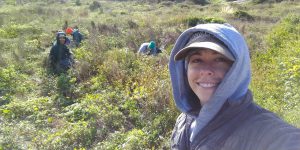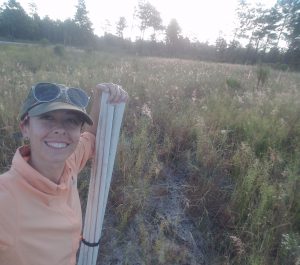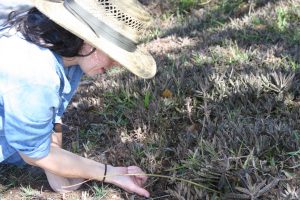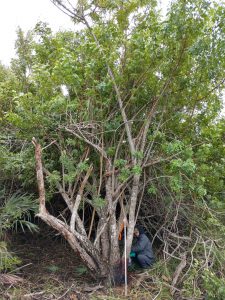By Katie Ray, UF/IFAS Center for Aquatic and Invasive Plants (CAIP) Intern
Jessica Solomon was born and raised a Florida native. Growing up in Miami and Clearwater, she spent most of her time exploring the outdoors after school.

“I have always been outdoorsy and interested in nature,” Jessica said. “As a kid in Clearwater, I spent most of my time after school in the creeks and woods around my neighborhood.”
At 18, Jessica moved to Gainesville to begin her education. She received her bachelor’s degree in Wildlife Ecology and Conservation from the University of Florida’s College of Agricultural and Life Sciences (UF CALS). Following graduation, Jessica moved to Berkeley, California where she worked at the University of California Berkeley’s (UC Berkeley) Field Station for the Study of Behavior, Ecology, and Reproduction. While at UC Berkeley, she worked with their colony of spotted hyenas. She then began working for a private ecological consulting firm as a biological monitor on construction sites. During most weekends, Jessica worked at International Bird Rescue doing medical triage on aquatic and oiled birds.
After moving back to Florida to be closer to her family, Jessica began work for the Florida Park Service as a program assistant in the AmeriCorps program Florida

Conservation Corps (FLCC). After two years, she began invasive plant management at Payne’s Prairie Preserve State Park. Through the FLCC’s collaboration with CAIP’s Florida Invasive Plant Education Initiative (IPEI) Jessica was introduced to the center and the idea of a graduate program.
“Through FLCC’s collaboration with CAIP’s Plant Camp, I was introduced to Dr. Enloe, who was looking for potential graduate students to join his growing invasive plant management lab,” Jessica said. “I now get to study invasive plant ecology and management and am very excited for my future in a career in invasive plant ecology.”
Now, Jessica is majoring in Agronomy at UF CALS as a graduate student. She is studying invasive plant ecology and management in Dr. Enloe’s lab at CAIP.

Jessica’s thesis surrounds the management of the invasive plant known as “Mother-of-millions” (Kalanchoe species). Multiple
species of this plant are exotic, invasive succulents invading natural areas around Florida, especially beach dunes. Jessica’s work specifically focuses on the Kalanchoe species invading the beach dunes in St. Augustine. Not invading one specific area of Florida, Kalanchoe has the ability to regenerate rapidly. This regeneration is possible because the plant reproduces asexually, rapidly producing and spreading plantlets. The plant thrives in Florida weather because long, hard freezes are not typical in this environment. Jessica studies management and spray techniques to limit the growth of this invasive and to prevent it from growing through native plants.

Outside of her research at CAIP, Jessica still works to help manage invasive plants.
“Outside of CAIP, I’ve assisted Enloe in cogon grass, natal grass, and Brazilian peppertree field experiments around Florida,” Jessica said. “I have also connected CAIP with the AmeriCorps program Florida Conservation Corps that works on invasive plant management in Florida State Parks, by updating their herbicide and safety trainings manuals, webinars, as well as in-person trainings.”
When she’s not researching Kalanchoe, Jessica can be found woodworking, creating stained glass, or gardening. Although Jessica will graduate in December of this year, she plans on re-entering the workforce right away.
“My dream job straight out of grad school would be a research position at a private facility or a University continuing invasive plant management research, working with herbicides or diving more into the ecology of invasive plants” Jessica said. “Hoping to get out of the South and explore other areas of the Eastern US.”
This piece was written by Katie Ray, the current UF/IFAS CAIP communications intern. Any questions should be directed to Shelby Oesterreicher at 352-273-3667 or soesterreicher@ufl.edu For more information about the UF/IFAS Center for Aquatic and Invasive Plants please visit https://plants.ifas.ufl.edu. Be sure to follow us on social @UFIFASCAIP.
UF/IFAS CAIP, Turning Science Into Solutions.
 0
0
